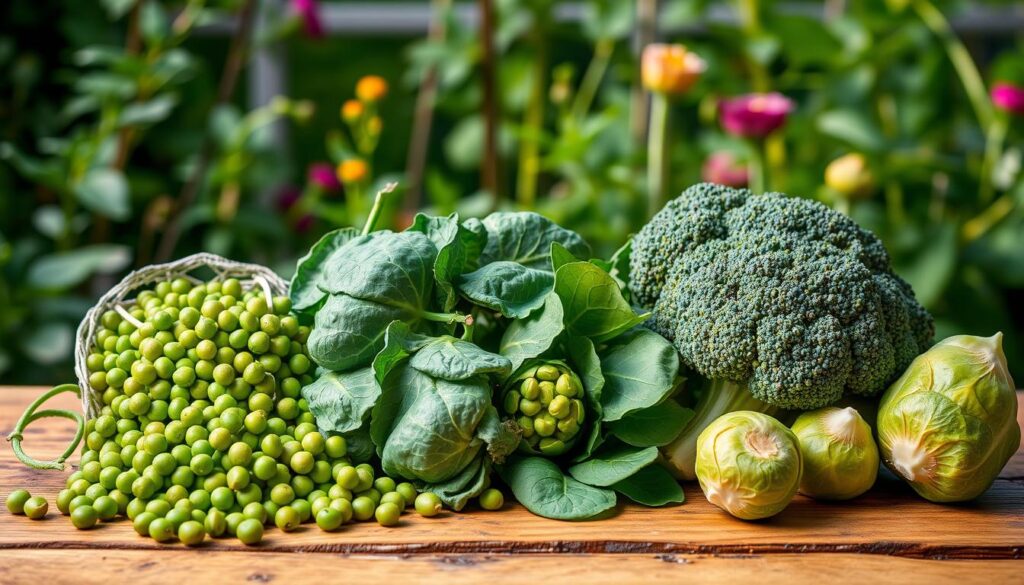Discover the power of protein-rich veggies for a healthier you! These nutrient-packed plants are key to balanced nutrition. They support muscle health, boost energy, and enhance overall wellness1.
Broccoli is a protein powerhouse. It contains 2.5 g of protein per cup and 2.8 g per 100-g serving1. High-protein veggies offer a great way to increase your daily protein intake.
From asparagus to Brussels sprouts, these plant-based proteins can transform your diet1. They’re a fantastic alternative to animal products for protein needs.
Key Takeaways
- Vegetables can be powerful protein sources
- Different veggies offer varying protein content
- Plant-based proteins support overall health
- Protein-rich veggies are nutrient-dense
- Diverse vegetable intake maximizes nutritional benefits
Protein-packed plants are your ticket to optimal nutrition. They’re perfect for vegetarians, fitness buffs, and anyone looking to eat better2. These veggies offer a tasty way to boost your health.
Understanding the Power of High-Protein Vegetables
Protein is vital for your health and wellness. It’s a key nutrient that supports many bodily functions. High-protein veggies are nutritional powerhouses that can boost your diet.
Why Protein Matters for Your Health
Protein is essential for life. It supports critical bodily processes such as:
- Muscle development and repair
- Immune system support
- Cell structure maintenance
- Enzyme and hormone production
The Role of Vegetables in Protein Intake
High-protein veggies offer more than just protein. Peas pack 8g of protein per cup3. Spinach provides 6g of protein per serving3.
These plant-based foods are complete wellness packages. They’re not just protein sources, but nutrient-rich powerhouses.
“Vegetables are nature’s multivitamins, packed with protein and essential nutrients.”
Benefits Beyond Protein Content
Nutrient-dense veggies offer incredible health advantages. Artichokes deliver 4.8g of protein per cup3. They also provide crucial vitamins, minerals, and fiber.
| Vegetable | Protein (per cup) | Additional Benefits |
|---|---|---|
| Peas | 8g | Fiber, Iron |
| Spinach | 6g | Vitamin K, Antioxidants |
| Artichokes | 4.8g | Digestive Health |
Pro tip: Eat a variety of veggies. This ensures you get different proteins, nutrients, and health benefits.
Top High-Protein Vegetables You Should Include in Your Diet
Protein-packed veggies can transform your daily nutrition. They offer a great way to boost your diet without relying on animal products4.
Dive into some amazing high-protein vegetable choices. These nutritional powerhouses can revolutionize your meals!
Check out these fantastic options to enhance your diet today.
| Vegetable | Protein (per 100g) | Key Nutrients |
|---|---|---|
| Edamame | 11.54g | Complete protein, fiber |
| Lentils | 8.38g | Iron, folate |
| Chickpeas | 8.23g | Magnesium, potassium |
| Spinach | 7.02g | Vitamins A, C, K |
Let’s explore some awesome protein-rich veggies:
- Edamame: A complete protein source with 11.54g per 100g4
- Lentils: Versatile legume with 8.38g protein per 100g4
- Chickpeas: Perfect for salads and hummus, offering 8.23g protein4
Pro tip: Mix these vegetables into your daily meals to naturally increase protein intake5.
Adults should aim for about 7 grams of protein per 20 pounds of body weight5. A 160 lb. person needs roughly 56 grams of protein daily.
These veggies can help you reach that goal easily and deliciously5.
Conclusion
Protein-rich veggies boost your nutrition powerfully. These vegetable protein sources greatly aid daily nutritional needs6. Experts suggest 0.8 grams of protein per kilogram of body weight daily.
High-protein vegetables offer more than just nutrients. They support overall health sustainably. Plant-based proteins like beans and nuts provide multiple benefits beyond basic nutrition6.
Choosing these veggies impacts your health and the environment positively. Plant-based foods produce fewer greenhouse gas emissions than animal proteins6.
Improving your nutrition can be tasty and easy. Edamame packs 18 grams of protein per serving. Broccoli offers 4 grams per cup7.
Aim for variety in your diet. This ensures you get a wide range of nutrients. Balance is key to supporting your health goals.
FAQ
How much protein do vegetables typically contain?
Which vegetables are the highest in protein?
Can I get enough protein from vegetables alone?
What additional benefits do high-protein vegetables offer?
How many vegetables should I eat daily for optimal protein intake?
What amino acids are found in high-protein vegetables?
Are cooked or raw vegetables better for protein intake?
Source Links
- High protein vegetables: The top 10 and how to eat them – https://www.medicalnewstoday.com/articles/318600
- Vegetables High in Protein: 19 Veggies and How to Eat More – https://www.healthline.com/health/food-nutrition/19-high-protein-vegetables
- 10 High-Protein Vegetables – https://www.eatingwell.com/article/7827684/high-protein-vegetables/
- 15 High-Protein Vegetables You Should Add to Your Diet – https://www.cookunity.com/blog/high-protein-vegetables?srsltid=AfmBOoq2fyGJeWsmADKJfK4JiqOKQ5zVqtdEkaPfx8_t_5NYe8RPakE9
- 10 Most Protein-Packed Vegetables – BCBST News Center – https://bcbstnews.com/bluehealthsolutions/10-most-protein-packed-vegetables/
- Protein – https://nutritionsource.hsph.harvard.edu/what-should-you-eat/protein/
- High Protein Vegetables: The Unsung Heroes of a Balanced Diet | Alpha MD – https://www.alphamd.org/resources/high-protein-vegetables-the-unsung-heroes-of-a-balanced-diet
